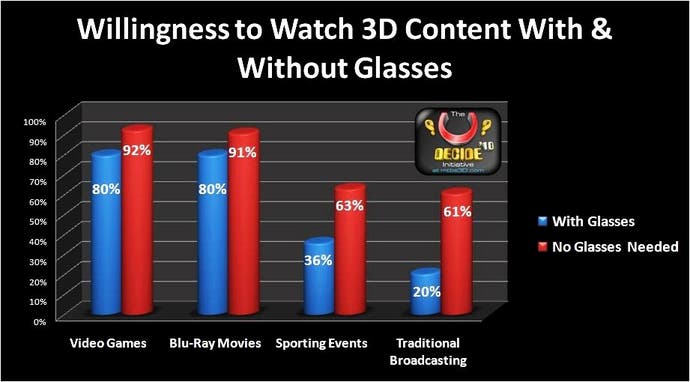"80% willing to game with 3D glasses"
Claims a new study.
Microsoft has dismissed 3D gaming as nothing more than a "science experiment", but according to a new study gamers are well up for the tech.
A whopping 80 per cent of gamers surveyed said they were willing to wear 3D glasses to play videogames, a finding that contradicts the widely held belief that having to wear 3D glasses is the tech's biggest put-off.
The new research from U-Decide Initiative, reported by Industry Gamers, found that interest in 3D climbs without the glasses. But the difference is marked for being smaller than expected. When glasses are no longer necessary, the participation level climbs just 12 per cent. There's a nice graph below.
Interestingly, 65 per cent of those surveyed said they already own a HD telly, and over 35 per cent are looking to buy a 3D telly within the next two years.

The results of the survey will no doubt please Sony – the PlayStation 3 manufacturer is going big on 3D, and Polyphony Digital's Gran Turismo 5 is expected to showcase the tech.
It should be noted, however, that U-Decide 2010, which is responsible for the research, was "made possible" by The S-3D Gaming Alliance (S3DGA), Panasonic, Electronic Arts, Ubisoft, Steelseries, Zalman, Blitz Games Studios, Computer Power User, and Meant to be Seen.
Digging a little deeper, the Initiative's website reveals the methodology behind the survey.
Two surveys, in fact, were conducted. One targeted at traditional 2D gamers who don't yet own S-3D display equipment of their own, the second survey intended for experienced S-3D gamers who own stereoscopic 3D equipment.
"Each respondent was only allowed to complete one of the two surveys, and we took special measures to prevent and remove accidental duplicates," said the company.

